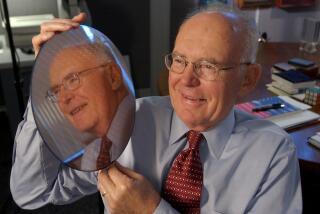He Claims He’s the Brains Behind Brains
- Share via
Gilbert Hyatt is a slender, bearded engineer who says he would never shoot the guns that are mounted over the fireplace in his modest, two-story home on a quiet La Palma cul de sac.
But he is not afraid to take steady aim when necessary to get what is rightfully his.
“I’m a little guy up against the big guys,” Hyatt, 52, said in an interview Wednesday.
And this David landed a Goliath of a blow when it was revealed Tuesday that he had been awarded a U.S. patent in July for inventing the technology to create the microprocessor, or computer on a chip. Hyatt had sought the patent for 20 years.
The news could turn the computer industry topsy-turvy and make Hyatt wealthy if he is able to collect millions of dollars in royalties from the world’s computer chip makers. It could also earn him a spot as an inventor whose innovation changed the world.
“I am happy that my invention was used to advance technology in so many ways,” he said, bearing a permanent blush from the recent media attention. “But it was frustrating without the recognition. This patent has settled everything in my mind.”
But the dispute is still far from being resolved.
The invention of the microprocessor, which has made possible most consumer electronic products including pocket calculators and personal computers, is frequently credited to a team of Intel Corp. engineers that included Ted Hoff, Federico Faggin and Stan Mazor.
They began working on the idea to help a Japanese calculator company in 1969, although Intel’s chip was not shipped until 1971. Texas Instruments also entered the market in the early 1970s.
But Hyatt, who has a stubborn streak that has been honed by two decades of legal battles and skepticism, says he is prepared to defend his claims against pretenders and deep-pocket companies that have until now been credited with the microprocessor’s development.
Hyatt said he makes a living as an aerospace consultant and hasn’t worked for a big company for 25 years because he fears the environment would “stifle creativity.”
When he worked to develop the microprocessor, it was for a company that he founded and ran himself. Micro Computer Inc., the start-up company, was funded by Hambrecht & Quist, a venture capital firm in San Francisco.
It grew to 25 employees between 1968 and 1971, but Hyatt said it folded in the midst of a dispute over rights to the technology. To his chagrin, rivals Intel and Texas Instruments received patents in the 1970s and developed millions of applications for microprocessors.
At the time, Hyatt could be faulted for being stubborn in refusing to share his patent rights, said Stuart Lubitz, a Los Angeles patent attorney who represented Micro Computer until it folded in 1971. Lubitz said Micro Computer fell apart because Hyatt resisted imparting the rights to his inventions.
“You can’t put Hyatt in the same boat with (chip pioneer Robert) Noyce or Jack Kilby,” the Texas Instruments engineer who co-invented the integrated circuit and the hand-held calculator. “They were far more successful at advancing the state of the art and were not as obsessed with paper rights.”
Hyatt acknowledged some stubbornness in his style, but he said he fought hard to have his patent approved because he believed that it was far more important than other inventions.
During the late 1970s, he continued to innovate but nearly soured on the inventing business after he was sued by Mattel Inc. for two electronics-related patents. He lost the suit to have his patents enforced, but a law firm in Washington saved him by picking up his legal costs.
The soft-spoken but spunky engineer has collected a patent for every year of his life. Much of his work in recent years has involved liquid crystal display technology.
“Some inventors just invent, but I try to be broad in my areas of interest,” he said. “I consider myself a scientist, an engineer and in some ways an entrepreneur.”
More to Read
Inside the business of entertainment
The Wide Shot brings you news, analysis and insights on everything from streaming wars to production — and what it all means for the future.
You may occasionally receive promotional content from the Los Angeles Times.










